|
|
|
Sort Order |
|
|
|
Items / Page
|
|
|
|
|
|
|
| Srl | Item |
| 1 |
ID:
188404
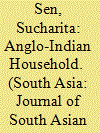

|
|
|
|
|
| Summary/Abstract |
This article subjects the personal narratives about the domestic spaces of expatriate Britons in India, or Anglo-Indians, to close scrutiny. The households of expatriate Britons were intended to mirror the racial distance of the formal imperial spaces, like clubs, parks and gymkhanas. But far from being an extension of public spaces that separated the colonised and the coloniser, the households embodied the multiplicity of social spaces. Interpersonal relations in these households complicated this bifurcation substantially. Space played a crucial role in the construction of a hierarchy–intimacy paradox in the households, where interracial intimacies existed in tandem with imperial hierarchies.
|
|
|
|
|
|
|
|
|
|
|
|
|
|
|
|
| 2 |
ID:
188402
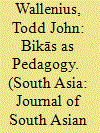

|
|
|
|
|
| Summary/Abstract |
Through the lens of an elite boarding school, this paper seeks to explore afresh the education–development nexus in Nepal. Moving beyond post-modern critiques of the development–schooling nexus, the paper draws on a historical understanding of development and concomitant notions of progress as emerging from earlier contacts between Nepali elites and the West. Combining this historical perspective with six months of ethnographic research at an elite boarding school in Nepal, the paper argues that the concept of development refers to the education of the individual through an emphasis on consciousness, self-discipline and character-building. This personalisation of bika¯
s operates as a holistic pedagogy that facilitates students’ embodiment of the national project through moral, physical and psychological progress.
|
|
|
|
|
|
|
|
|
|
|
|
|
|
|
|
| 3 |
ID:
188403
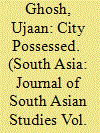

|
|
|
|
|
| Summary/Abstract |
The mid twentieth-century Bengali ghost story has a distinct urban form. From haunting Gothic mansions, ominous bungalows and thickets of trees, the ghosts of mid twentieth-century fiction show up in the streets of Calcutta, on motorised omnibuses, in urban movie theatres and even selling cocaine in the docks of the city. In this paper, I explore why Bengali ghost stories in the twentieth century predominantly choose the city as a motif to situate their hauntings. I analyse two spectral texts from the mid twentieth century, ‘Kankal Sarathi (The Skeleton Chauffeur)’ by Hemendra Kumar Ray (1888–1963) and ‘Andhakre (In Darkness)’ by Sharadindu Bandyopadhyay (1899–1970), and juxtapose them alongside the official urban archive. Significant changes took place in Calcutta’s urban planning at the turn of the twentieth century. Committed to ‘improving’ the city, planners sought large-scale demolitions of existing buildings, which resulted in massive displacement of individuals and communities. Historians have recorded the deep disquiet these changes induced in the city’s inhabitants. What I demonstrate are the ways in which ghost stories responded to these infrastructural alterities. Spectral narratives emerged as a new literary strategy through which the city’s new journey towards infrastructural modernity was critiqued. The larger methodological question I wish to explore is whether it is possible to treat the genre of horror as an extended archive of historical inquiry.
|
|
|
|
|
|
|
|
|
|
|
|
|
|
|
|
| 4 |
ID:
188405


|
|
|
|
|
| Summary/Abstract |
This article traces the historical roots of contemporary housing struggles in Mumbai, Delhi and Kolkata, emphasising the long-term impacts of post-Partition refugee resettlement. Analysing Partition as a ‘critical event’, we discuss the distinct ways in which local administrators, political leaders and city residents responded to the arrival of hundreds of thousands of refugees, traumatised, impoverished and made homeless by Partition. As they responded, city boundaries were expanded, housing policies were revised and new political repertories were established. Noting both the ruptures and continuities, we present a framework for analysing the impacts of critical events on urban politics and housing rights.
|
|
|
|
|
|
|
|
|
|
|
|
|
|
|
|
| 5 |
ID:
188400
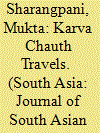

|
|
|
|
|
| Summary/Abstract |
This essay is a rumination on food, family and feminism. It investigates the enduring popularity of Karva Chauth among North Indian, dominant caste, married, working women in the San Francisco Bay Area. It highlights the significance of the fasting–feasting ritual in a range of self-shaping projects. By excavating the meanings embedded in food in women’s worlds, it privileges gendered experiential knowledge and forwards and repositions a nuanced understanding of agency, power and self-expression in the formation of diasporic identities.
|
|
|
|
|
|
|
|
|
|
|
|
|
|
|
|
| 6 |
ID:
188408
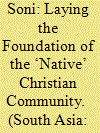

|
|
|
|
|
| Summary/Abstract |
This article traces the historical trajectory of the work of the Church Missionary Society (CMS) in orphanages in north and western India through two case studies of the important and well-documented CMS orphanages, the Secundra and Sharanpur Orphanages. In doing so, the article makes two historiographical contributions. Firstly, it brings to the forefront the significance of famine orphans and orphanages in the global evangelical Christian project. Secondly, contrary to the overwhelming focus on the sentimentalisation of childhood in historical literature, it asserts that along with factors that point towards such sentimentalisation, other aspects also contributed to the decline in popularity of orphanage work among CMS missionaries.
|
|
|
|
|
|
|
|
|
|
|
|
|
|
|
|
| 7 |
ID:
188406
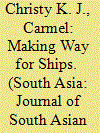

|
|
|
|
|
| Summary/Abstract |
This article foregrounds the interlinkages between the urban space-making of Kochi, religion and the displacement of shore communities in the decades after the Independence of India in 1947. I analyse the happenings and narratives around post-Independent India’s development initiatives as a site to understand space, land and sea as crucial resources in relation to the development of the city and the displacement of the shore communities. Specifically, I examine how the establishment of the Cochin Shipyard, a public-sector company which builds and repairs ships, is entangled with displacement and religion in the development history of Kochi, a comparatively small port city on the south-western coast of the Indian subcontinent. I also trace the refiguring of the displaced people’s land as the place of ‘revengeful ghosts’ in vernacular literature, which, I argue, shows anxieties about the unjust treatment of the evicted communities. I use a diverse range of sources including newspaper reports, biographical notes, ethnographic accounts, myths and literature to recreate this forgotten chapter in the development of Kochi.
|
|
|
|
|
|
|
|
|
|
|
|
|
|
|
|
| 8 |
ID:
188401


|
|
|
|
|
| Summary/Abstract |
Bangladesh has been following the neo-liberal economic model since the early 1980s. Manifestly, consecutive state authorities have failed to reduce the inequalities between different social groups in the last forty years. This article examines how the reform policies resulting from the liberalisation and privatisation of Bangladesh’s economy have created avenues for a handful of business elites to surge and control its economic and political decision-making mechanisms. It also illustrates the impacts of neo-liberal reforms on the socio-economy and health-care sector of the country. Finally, this paper argues that the consequences of pro-market reforms have played a significant role in weakening the ability of the state to respond appropriately to the ongoing COVID-19 pandemic in Bangladesh as the government is compelled to maintain its nexus with the business elites rather than focus on the well-being of all its citizens.
|
|
|
|
|
|
|
|
|
|
|
|
|
|
|
|
| 9 |
ID:
188407


|
|
|
|
|
| Summary/Abstract |
This paper reveals the racialisation of India’s post-colonial citizenship regime by following the history of the National Register of Citizens (NRC) in Assam. Assam’s NRC shows how political elites at both the subnational and national level have excluded minority populations through multivalent racialised nationalist imaginations. I show how racialisation is an important analytic to understand how ethnic, linguistic and religious groups are essentialised in relation to one another, and I contend that citizenship is embedded within these historical and social processes. I conclude that challenging the NRC must go beyond critiquing the process as a bureaucratic nightmare to contend with borders that entrench exclusionary ideas of citizenship towards imagining emancipatory futures.
|
|
|
|
|
|
|
|
|
|
|
|
|
|
|
|
| 10 |
ID:
188399


|
|
|
|
|
| Summary/Abstract |
Is dakaiti in Central and North India a unique form of banditry? Can social banditry exist in a caste-oriented society? How have normative, discursive and moral structures interacted with dakaiti in India? What was the relationship between dakait bands, the state and society—symbiotic, incompatible, or something else? These are a few of the questions this study explores. Dakaiti in India not only begets a new definition of social banditry that challenges Hobsbawm’s assertion that the phenomenon may only transpire in a premodern and pre-industrial society, but also Blok’s argument, contra Hobsbawm, that bandits—as ‘champions of the poor’—are chimerical. Placing excessive emphasis on caste, however, has two main consequences. First, it makes it difficult to recognise social banditry in India and, second, as a result, the causes of the noteworthy decline of dakaiti in India in the 2000s are obscured.
|
|
|
|
|
|
|
|
|
|
|
|
|
|
|
|
|
|
|
|
|